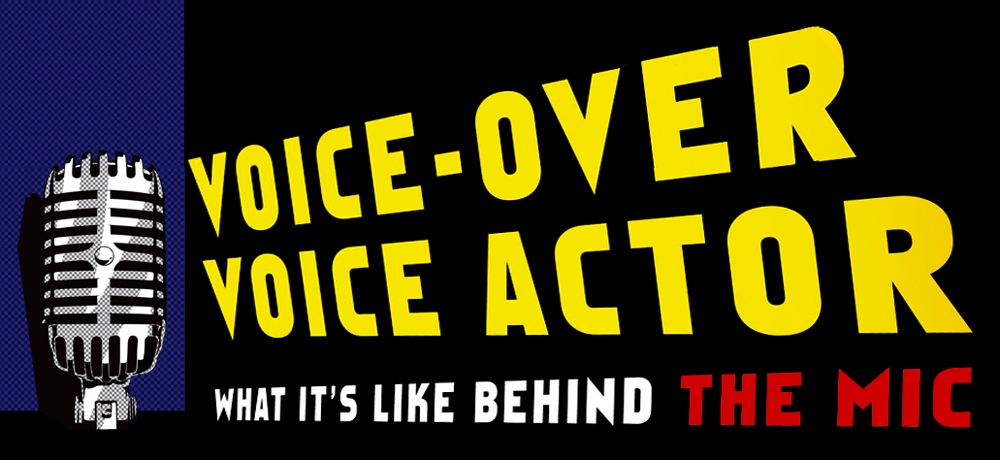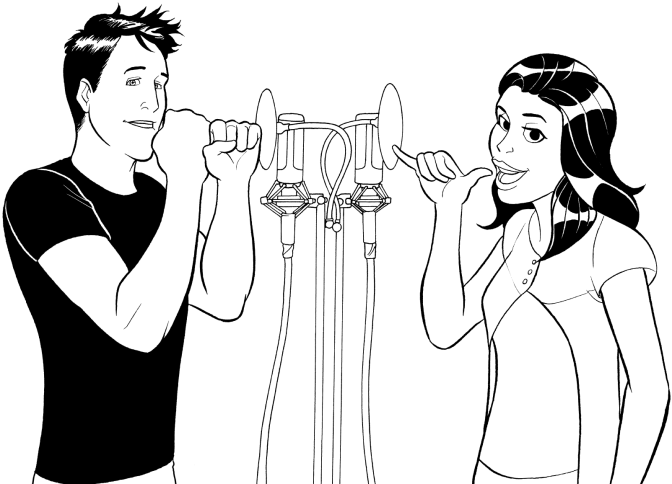One of the things you need to know before you start auditioning is the importance of creating a strong character. We’ve noticed that the people who really succeed in this business are generally good actors first, good voice-over actors second. Strangely enough, when juggling all the balls of voice-over, one of the easiest to drop is the acting. Acting is where the most fun is, so who wants to drop that ball?
 So, how do you start creating a character? Make clear character choices: The Importance of the W’s: Who, What, Where, When, Why, and hoW
So, how do you start creating a character? Make clear character choices: The Importance of the W’s: Who, What, Where, When, Why, and hoW
Sure, these questions are important for reporters, but they’re also important for you (assuming you’re not already a reporter). They’re the questions that help you make clear character choices. Luckily, in most cases you’ll have a script to draw from, and it’ll be chock full of answers to these six questions.
In some ways, acting is like being a detective. If you can find enough clues and put them together, things begin to make sense, and you don’t have to do anything special. Thinking about reasons why your character says or does something (as indicated in the script) can often help you make creative choices that will help your work stand out and bring your character to life.
1. Who are you: what kind of a person/creature/thing are you? What is important to you? Who is the character you are you talking to, what is your relationship to him/her/it?
2. What are you doing, what have you done, what do you plan to do, and what’s going on?
3. Where are you physically, where are you usually, where would you like to be, and just where are you in the telling of the story?
4. When is this scene/story/moment taking place and how much time do you have to do whatever it is you’re doing?
5. Why are you doing/saying what you are doing/saying anyway? Why aren’t you saying/doing something else?
6. And finally, how does your character choose to do what he/she/it is doing, and how is that different from how you, yourself, in real life might do it?
Often, pondering the differences between how you might do or say something and how the character does or says it will teach you something important about the character.
Between your imagination and the script, you should have more than enough information to flesh out a unique and real character. Actors often try to make choices because they feel an idea will be interesting or cool – regardless of the information they’ve been given. Try, instead, using your yes, and powers to see what makes sense in terms of the story that the writer has given you. Would that Martian speak with a German accent just because it would be kooky and fun for you to do, or because the script indicates that the only interaction Martians have had with Earth has been through German soap opera broadcasts?
And don’t get caught up in thinking, Well, I’ve never been to Mars. How am I supposed to know what a Martian sounds like? Or something closer to home, like, Well, I don’t have a brother, so how am I supposed to know how that feels?
Odds are, if you’re interested in an acting career, you probably have a pretty active imagination. Use it. It’s fun. Your imagination is like your voice or a fingerprint – unique. Using it will automatically make your take on a character different from anyone else’s.
Even when you’re dealing with sterile commercial copy, something as simple as, Come in today for a great deal! it can be easy to just say the words without even thinking about it (which isn’t always bad). But try taking a second to get specific about what you’re saying. Think of a person you know, and deliver the line as if it’s just for that person. Imagine the circumstances under which you could be telling this line to someone. For example, what if you’re telling your little sister who never listens; or what if it’s a secret that you don’t want to be overheard; or what if you’re in a hurry to get the info out because the deal ends in fifteen minutes? Suddenly, this simple, throwaway sentence has taken on a whole life of its own, just in the time it took to ask and answer the W’s.
Specific choices and clear ideas on how you feel about what you’re saying take your work to the next level. Sometimes things aren’t clearly laid out on the page, and you can’t ask the writer what he or she meant. This is where you get to make up some things, get your creative juices flowing, and harness that wild imagination of yours. This is where things really get fun.
Let’s say the scene is between two brothers, and the only lines are the older brother saying, I’m taking you to the zoo, and the younger brother saying, Okay. The writer hasn’t given you much to go on here, but nobody’s keeping you from filling in the blanks on your own. Maybe the last time the younger brother went to the zoo he was attacked by monkeys, and he was left traumatized by the event. You’d better believe that’s going to color how he says, Okay.
Or maybe the older brother’s never done anything nice for his little brother before, so the little brother’s Okay is a suspicious one. In life, we’re rarely indifferent about things. We almost always have an opinion or feeling towards almost everything we encounter, so why wouldn’t our characters have their own opinions and feelings? Humor and drama come directly from our relationship to the things in our environment and from how we react to those things.
+++++++++++++++++++++++++++++++++++++++++++++++++++++++++++++++++++
Check out our VoiceOverVoiceActor website for more tips and exercises. We post daily VO tips on Facebook and Twitter, and our book, Voice Over Voice Actor: What it’s like behind the mic includes a wealth of exercises to build your voice and keep it ready for a successful voice over career!
 Vocal chords are vocal chords, whether we use them for singing or speaking (or shouting! :-) The voice is an instrument and good health and neuro plasticity can be across the board.
Vocal chords are vocal chords, whether we use them for singing or speaking (or shouting! :-) The voice is an instrument and good health and neuro plasticity can be across the board. 












 Thanks to Jason Bermingham of Sound on Sound:
Thanks to Jason Bermingham of Sound on Sound:

